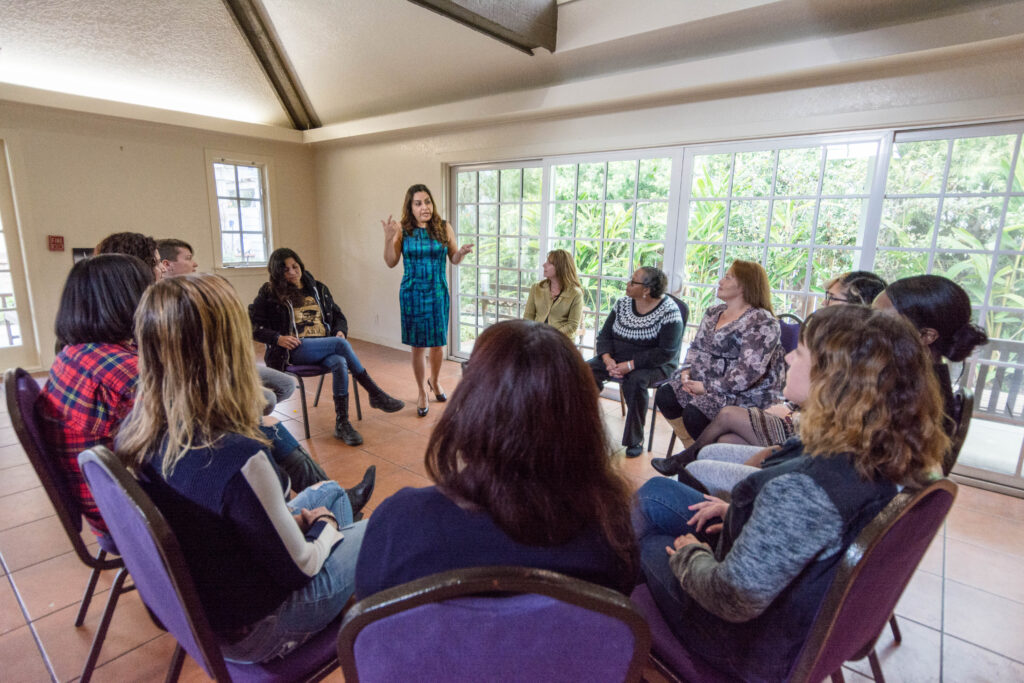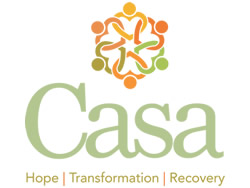Treatment Programs - Groups

Casa takes pride in highly effective and evidence-based groups on our schedule that treat the whole person.
Some of those groups include:
Process Groups
These groups encourage women to develop the ability to listen to their own voices, often lost in the process of addiction. Groups help participants challenge false beliefs and low self-esteem issues and express their feelings, wants and needs. For many, these are powerful new ways to look at themselves and their worlds while encouraging them to build relationships of trust and friendship with their fellow participants while practicing new behaviors.
Co-Occurring Disorders
Previously called “dual-diagnosis,” a co-occurring disorder is when one has a substance use disorder that is present with other mental health disorders. Often there is a connection between addiction and mental health disorders, with approximately 40% of adults with addictive disorders have a co-occurring disorder1. Our Co-Occurring Disorders Group helps our clients understand the link between a mental health disorders, diagnosed or undiagnosed, and the way that they sought substances to treat the symptoms of those disorders. The group also educates clients about the importance of medication compliance and its role in relapse prevention.
Addiction Education
Often clients come to treatment feeling a sense of shame for their substance use disorder. Feeling shame about addiction is as useful as feeling shame about any other chronic disease like diabetes or heart disease. Our Addiction Education groups educate clients about the biopsychosocial model of addiction that involves environmental and biological impacts, the brain chemistry of addiction, and what drives relapse.
Relapse Prevention
Craving and obsessing about using the drug of choice is “built in” to the recovery process and as with any chronic disorder, relapse is sometimes part of the clinical journey. Education and preparation can help one avoid relapse! Our relapse prevention groups help our clients identify potential triggers to relapse, develop coping skills to deal with obsessing and craving, and learn alternative responses to assist them in making the necessary and healthy decisions earlier in the obsession process.
Family Systems
Education and family groups examine dysfunctional family dynamics and how to develop new skills to improve family communication, conflict resolution skills, strengthen appropriate boundaries, embrace personal differences and improve listening skills and acceptance of all family members. Addiction is a family disease and requires that all members of the family identify their own issues and develop the ability and willingness to change. When positive changes are embraced, sobriety is easier to maintain.
Family Violence
Domestic violence, emotional abuse, bullying behaviors, abuse among siblings, manipulative and inappropriate expectations of children and other family issues often impact women’s choices and normalize dangerous and maladaptive behaviors that put women at risk and encourage addiction and perpetuate the cycle of violence in women’s lives. Participants explore and process these issues, challenge the cycle of violence and offer alternatives to violence.
Dialectical Behavioral Therapy (DBT) / Mindfulness
Dialectical Behavioral Therapy (DBT) Mindfulness is an effective therapeutic strategy to assist with emotional regulation and daily stressors. In this group we work with clients to help them develop healthy and non-judgmental mindfulness skills that assist them in day-to-day stress reduction, which is an effective relapse prevention tool as well.
Anger & Co-dependency
Both of these issues deal with boundary violations, lack of self-care and lack of assertion skills, all of which manifest themselves in addicts/alcoholics and their families. Learning what is your responsibility and what is not and how to appropriately assert your needs and set your boundaries can be a big game changer for you and everyone in your life. As you become healthier, so do your relationships.
Grief and Loss
Unresolved grief and loss are often major underpinnings of addiction. At Casa, participants are given an opportunity to explore these issues in their lives and work through their grief, recalling unexplored losses and often transforming the focus of their processing from grief to loving memories and fond remembrances.
Health and Fitness
By the time someone arrives to treatment, they have often neglected their physical and nutritional health, and this has a big impact on how they feel in early recovery. Our residential treatment program includes fitness groups that assist the client in getting into a healthy routine. We also educate our clients about the importance of good nutrition and working with a physician to address any physical health problems.
Healthy Relationships
The development and persistence of substance use is affected by environmental factors, and often a client arrives with unhealthy relationships or relationship behaviors that have reinforced relapse and continued substance use. In this group the clients learn about the healthy boundaries they may need to set with others to maintain their recovery, and how to involve their family system in a healthy way so that the whole family recovers together.
Trauma and Healing
Unfortunately, sexual, emotional and physical trauma are a large part of most women’s stories. For many, these stories have never been shared and have been silenced with the fog of addiction. Removing the alcohol and drugs and creating a safe and open environment allows participants to share their stories and leave these experiences in the past along with misplaced shame and guilt that may have underlined their addiction for years.


